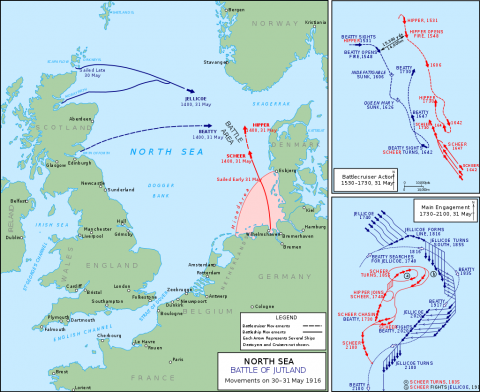Outnumbered German Fleet bests the British in the great Battle of Skagerrack
A map showing the battle of Jutland. Click to enlarge.
KNOWN TODAY AS THE Battle of Jutland, between Britain's Royal Navy Grand Fleet under Admiral Sir John Jellicoe, and the Imperial German High Seas Fleet under Vice-Admiral Reinhard Scheer, the Battle of Skagerrack was the largest naval battle and the only full-scale clash of battleships in WWI, plus the last major battle in world history fought primarily by battleships. It took place from May 31 to June 1, 1916 off the North Sea coast of Denmark's Jutland Penninsula, utilizing a total of 151 British combat ships to 99 for Germany. Both sides claimed victory even though the British lost more and larger ships (14 to 11) and more than twice as many sailors. The British press criticised the Grand Fleet's failure to force a decisive outcome. THE FATHERLAND celebrated the German showing and skill in several articles which I have reproduced below.
The Republican National Nominating Convention was underway in Chicago, but as news reporting was much slower in those days, and the outcome was not decided ahead of time, the choice was not yet known. Also note the return of my favorite writer, Edmund von Mach. -cy
vol. 4 no.19 June 14, 1916 Page 10
THE BATTLE OF SKAGERRACK
Editorial
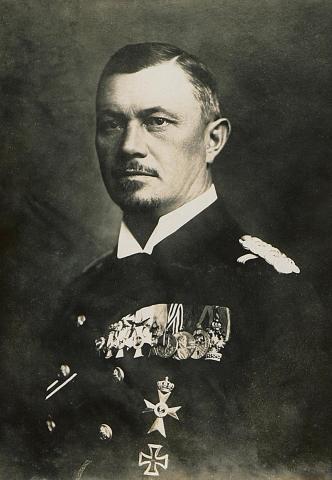
Right: Reinhard Scheer, German Fleet Commander.
IT is, indeed, an irony of fate that William II should revenge Napoleon I. Skagerrack wipes out Trafalgar. Beaten on land, Great Britain is now defeated upon her own element, the sea. When the first news of the defeat of the British Main Fleet reached London, England was so paralyzed that, for the moment, she lost even the power to lie. When, however, the full force of the blow dawned upon Great Britain, every liar, from Sir Jellicoe and Lord Beresford down to the editor of the New York Times, was summoned for duty. Englishmen are still willing to lie for their country. Anglo-American hyphenates are contented to lie for her. But all the lies of all the liars of England and her creatures in the United States cannot bring England's cruisers and dreadnaughts from the bottom of the sea. All their lies cannot bring to life even one of those poor sailor lads who died because Sir Edward Grey lied to his country. All the editorials of the New York Times, all the scarelines of the new York Herald, cannot sink a single German gunboat.
In her colossal attempt to humbug the world England attributes to her foes the ruses which she herself is accustomed to practice. Thus she tells us that the Pommern, admittedly sunk, was in reality a dreadnaught named after the small battleship in question. This is exactly the trick which we suspect England to have played in the case of the Tiger. It is entirely contrary to the German tradition. The world has lost faith in Great Britain. All these efforts avail her nothing. What credence can be given to a Government which deliberately falsified, week after week, the records of Liege and Namur? What trustworthiness can an Admiralty claim which has not admitted officially to this day the destruction of the Audacious? The losses of the other side on land or sea are always difficult to determine. Erroneous statement in that respect may be unavoidable, although Germany seems to be pretty accurate in her estimates of British losses. But every Government knows exactly the extent of its own losses. Germany holds a striking record in this regard: the correctness of her official bulletins is recognized by all neutral nations.
From the beginning of the war Falsehood has been England's most effective ally. But never have the English lied so desperately as now. England's world power rests not merely upon her navy; it rests far more upon her reputation for invincibility upon the sea. If that reputation is shattered, even her navy will not be able to protect in the long run her oversea possessions. India, Egypt, Australia will be snatched from her diadem. England's navy has suffered heavily, but her prestige has suffered even more. If the battle of Skagerrack was a victory for Great Britain, it was the sort of victory that was not popular with King Pyrrhus. If the battle of Skagerrack is repeated, King George may well exclaim with King Pyrrhus: “Another such victory, and I am lost.”
If Germany were desperately in need of peace, she would permit England to score a victory somewhere on some field of action. At the Dardanelles, at the Tigris, everywhere England has suffered defeat. In all this war, England has won only one battle, and o that victory she will hardly be proud. We refer to the battle of Dublin. There she won, with her five million men in arms, with her matchless navy, against a handful of unarmed poets and dreamers! She cannot ask her people to sign a peace treaty, when she has nothing to show for her gigantic sacrifice in blood, iron and gold. The only road to peace is to permit England to win a victory by a gentlemen's agreement, or to beat her down to her knees. At present she is sorely defeated, but she is not yet beaten. She still desires to save her face.However, her final breakdown is only a matter of time.
[…]
The battle of Skagerrack was a victory for the United States. It was a victory for the principle demanding “the security of the highways of the sea for the common and unhindered use of all the nations of the world.” Before the war many of us believed that piracy was a thing of the past. This was a fatal delusion. Piracy lives while the British Navy lords it over the sea. John Bull is the last of the pirates. When he is disposed of law will take the place of outrage on the sea. Piracy will be dead.
DEADLIEST WEAPON OF NAVAL WARFARE
From the New York American—As fuller details of the great sea battle come to hand, we are more and more convinced of the superiority of the typewriter as a naval weapon over the dreadnaughts and battle cruisers.
The first phase of the battle off the Danish coast began on Wednesday, and was a fleet action between battle cruisers and destroyers and submarines.
The second phase was an all-night battle, consisting of individual fighting between dreadnaughts, cruisers, destroyers and submarines.
At the conclusion of this second phase on Thursday morning the British Admiralty announced the defeat of the British fleet.
At this state the third phase of the battle began with a mobilization of the whole available London correspondent's auxiliary naval reserve and after seventy-two hours of heroic action the defeat of Thursday was converted into the glorious victory of Sunday.
The empire certainly owes an immense debt of gratitude to the dauntless heroes of the press both in London and in New York, who have again restored the prestige of the British navy by thus winning the most unique victory which history has yet recorded.
We can re call nothing in the annals of naval warfare to equal the superb gallantry and skill with which the journalistic auxiliary naval reserve has demolished ship after ship of the Teutonic enemy during the past four days, and the astonishing success with which it has converted a depressing defeat into a glorious triumph without the loss of even so much as an ink pad.
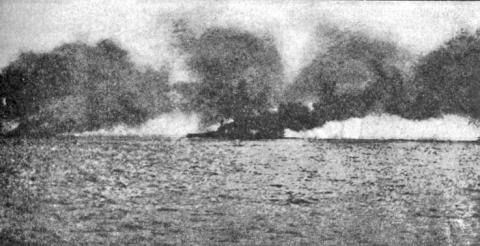
Vice-Admiral David Beatty's flagship HMS Lion burning after being hit by a salvo from SMS Lützow.
Below: Destruction of the battlecruiser HMS Queen Mary at the Battle of Jutland
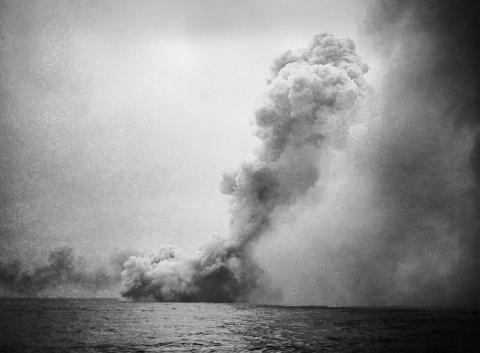
vol. 4 no.19 June 14, 1916 Page 4
“ANGLO-SAXON LEADERS OF THE WORLD”
by Edmund von Mach
On the day after the great naval victory of the Skagerrack an editorial, entitled “Anglo-Saxons” appeared in the New York Evening Mail. The writer related how Mr. S. S. McClure on his recent visit to Germany, had proposed the toast of an alliance between Great Britain, Germany, and the United States, and how the toast had been answered with cheers. “It does the heart good,” the writer went on to say, “to learn that amid all the horrors and hates of war the ideals of an Anglo-Saxon leadership of the world still live.”
The Evening Mail has the reputation of being one of the few eastern papers printed in English that understands the German heart and prints the truth. In this particular case, however, it not only uttered a falsehood, but by implying that the Germans abroad and the Americans of German descent subscribe to this heresy, called for a vigorous protest.
It is true that “the ideals of an Anglo-Saxon leadership of the world” may still be surviving in the hearts of the English themselves and of the pro-English American financiers and society people. Everywhere else, however, they are dead. In America, especially, the great masses of the people have long since renounced the ideals of the leadership of the world of any race or nation. Nations like people should be equal, and be free to make use of equal opportunities. The competitive test of strength of armaments and wealth, much of which was wrongfully acquired in earlier ages, when robbers were national heroes, should give way to the competitive test of efficiency.
The people of German descent in this country have always cherished these modern ideas, which are the only ideas on which a stable peace will be possible. And during the decade before the war, also large numbers in the Fatherland had gradually come to accept the same ideas. Whether the world at large is ready for them now after two years of terrible suffering, is not yet clear. There are, in fact, indications that this is not the case.
The honest acceptance of these ideals is predicated on the “GOLDEN RULE.” As long as we are unwilling to treat other nations as we should like to have them treat us under similar circumstances, and instead of asking what is right and just, ask what are we strong enough to exact, just so long shall we be unable to assume the leadership in the interest of advanced ideas.
So far as the people of German descent in this country are concerned they are ready, as they have always been, to acknowledge the equality of races and nations. If, however, such equality is denied then may God grant that they have learned their lesson so well that they will never again meekly join in the pagan chorus of the Anglo-Saxon leadership of the world.
The world is growing democratic, and in a democratic world there is no place for the leadership of any one race or nation. All American newspapermen, returning from abroad, agree that Germany is today more truly democratic than any other country and that neither wealth nor birth give the holder privileges over anybody else. So it should be, and so some day it will be even without the pressure of a horrible war. And may the people with German blood in their veins be the ones who assist in spreading these ideals over the whole world.
It would, however, be more than foolish to hope for the realization of these ideals so long as the belief in the superiority of the Anglo-Saxons prevails. It is, therefore, the duty of all lovers of freedom to combat it with every legitimate means at their disposal. Ready to acknowledge the equality of nations at all times, let Germans throughout the world declare that never again will they submit to Anglo-Saxon domination, be it on the sea, or on land, or in this, our glorious country, that was founded in the interest of freedom and humanity.
Germany is fighting a wonderfully heroic fight against odds such as the world has never seen. Her military courage, while nothing new, fills those who have German blood in their veins with pride and makes their hearts beat joyfully. In many instances, however, it has not yet stirred them into action. There are countless Germans all over the world who have not yet dared to show their civil courage. It is not the German laborer or man of small means who has held back, but many rich men, allied in business with the privileged classes that have prospered under Anglo-Saxon rule and hope to prosper under its continuation, have not yet publicly spoken as their hearts must have been prompting them to do.
While the Germans in this country can do little to relieve the suffering due to the war which the Anglo-Saxon claim to supremacy in the world has forced upon Europe, they can do much toward making the victory over Anglo-Saxon arrogance complete. Let them recognize what is good in the individual Anglo-Saxon, but beyond that let them in word and deed—and especially in deed—prove to the world that Anglo-Saxon, notably British, leadership of the world is a thing of the past.
With their faces set to the rising sun of progress let them forget the night that is past when ships had to said by the British star. Let them be proud! Pride that is deserved is a good companion through life. The Germans have had too little of it. Justifiable pride makes men strong. Let the Germans in this country, therefore, “remember the block whence they were hewn,” and their very character and their lives will make a mockery of the claim to “Anglo-Saxon leadership of the world.
Behind the Scenes at the Capital
WASHINGTON, D. C., June 7—Interest here is entirely centered in Chicago, where the Republican forces are gathering for the convention which is to nominate the man who will contest the election with Woodrow Wilson. As a result, this was the dullest week of the legislative season. Ogden Armour and other millionaires have promised to bring the almost solidified backing of Wall Street to the support of [Theodore] Roosevelt, and Roosevelt is making one of the most sensational campaigns that any office-seeker ever engaged in, as the Knownothing candidate for the Presidency. The issues he has created are distinctly recognized as the Knownothing issues of the 'forties and 'fifties of the last century. As a last desperate expedient Roosevelt again threatens to bolt the Republican party unless either he is nominated or some candidate who is against “the hyphens.” National issues have been subordinated to that of “the hyphens,” because the hyphen is against Roosevelt and everything he stands for. Even Justice Hughes has been challenged to define his attitude on this question on penalty of being knifed by the bolter of 1912.
The Republicans don't want the Knownothing candidate. They know they cannot win without the support of the hyphens, but they have not presented a man who stands up for broad Americanism untainted by the sickly influence of Great Britain in our national politics. But as the candidate will probably have been named by the time this appears in print, it is serving no practical purpose to continue the discussion.
The matter must be settled after the convention. If the Republicans are fools enough to nominate a second edition of Wilson and adopt a platform that by indirection seeks to punish those who are not in harmony with our pro-British policy, it will be necessary to nominate a third ticket, or that failing, to concentrate the fight on Congress and see that only such men are elected as will stand up for an American policy directed against the Allies as well as the Central Powers.
* * * *
SOME of the financial sharps in Congress find a striking link of sympathy between the attempt of the English Admiralty and its American newspaper organs to make the world's greatest naval battle appear an English victory and the announcement of the staggering deficit which England is called on to cover. According to an Associated Press dispatch of June 2, from London, Reginald McKenna, Secretary of the British Treasury, declared that England is $5,525,000,000 behind in her running expenses for 1916-17, which will have to be made good by taking up new loans.
This, coming on the same day that the world's confidence in the invincibility of the British navy was so rudely shattered by the defeat of her high seas fleet at the hands of the Germans, makes it incumbent on every patriotic Englishman, native and subsidized, to represent the awful defeat as, in fact, a defeat for the Germans.
Where is the money to come from to save England from bankruptcy? Incomes, it is pointed out, are now taxed 35%. That means that a man with an income of $5,000 must turn $1,750 of it over to the tax collector for the war, leaving him $3,250 out of which to defray his living expenses, which have increased over 50%.
In June, 1914, prices of forty-five commodities averaged 81. At present they average 138. Part of the proposed loan of upward of five billions, of course, is expected to be taken in the United States. Morgan and his Wall Street crowd are expected to raise the money which England needs to save herself from financial ruin, which local oracles have been predicting for six months as sure to come speedily. This crowd controls the eastern papers in conjunction with Lord Northcliffe.
And this explains why the same tactics are pursued to hoodwink the world that was followed in denying the destruction of the Audacious, as well as a superdreadnought in the North Sea fight of January, 1915, the complete concealment of the great Russian disasters under Hindenburg, and the persistent efforts to belittle the German victories around Verdun. In this case it is even more essential to conceal the truth, because the German victory over the English fleet has had a decisive tendency, as diplomats here admit, of shaking the last remnant of confidence in Britain's chief bulwark—her “wooden walls.” It will be twice as hard now to raise money as ever before.
* * * *
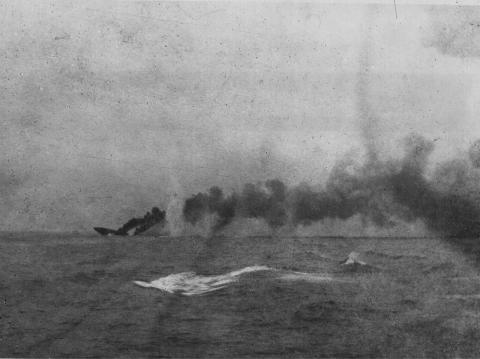
In the distance the British battlecruiser HMS Indefatigable sinking after being struck by shells from the German battlecruiser Von Der Tann first in "X" magazine and then once she had limped out of the line she was hit by another salvo on the foredeck, the resulting explosion then destroying her. All but two of Indefatigable's crew of 1,119 were killed in the blast.
[…] SOME of the naval experts in Washington are not fooled even a little bit as to the truth of the great naval battle of May 31.
“It doesn't require a technical education to determine the facts,” I heard one of them explain to a member of the Foreign Affairs Committee.
“The distance from the Orkney Islands to a point midway between Horn's Riff and Skagerrack, where the battle took place, is approximately 450 miles,” he said. “It is obvious that the British fleet did not come all that distance except for one purpose—that of destroying the German fleet and entering Wilhelmshaven and the Kiel Canal.
[…]
“Now, it being fairly proven that the British went over to 'pull the German rats out of their holes,' as Churchill declared—it follows that the papers are not telling the truth when they say that the British suffered their greatest losses because they had nothing but cruisers and small craft engaged in the early stages of the battle.
[…]
“The early German and British official reports do not vary materially. The positive manner in which the German Admiralty announced the destruction of the Warspite makes me think that the British may be pursuing the same course that they did in denying so long the destruction of other of their best vessels on previous occasions. To admit that the best vessel in the British navy had been sunk would come very near to creating a revolution in England. It is admitted that the Warspite was badly damaged as was the Marlborough—first reported by the Germans to have been struck by a torpedo. It is possible that the damage was so great that both vessels will be out of the running hereafter. When you consider that the British Admiralty was guilty of reporting the sinking of the [German] Moltke and decorating the English officer, who it was alleged sank her, whereas the ship was later reported unharmed by American investigators, and then recall how often the Goeben has been destroyed, you can form your own idea of the impeccability of the British reports.
“I can hardly see how England can possibly claim a victory, when by her own admission she suffered at least twice the material damage and twice the loss of life that the Germans did, and when both Rear-Admiral Horace Hood and Rear-Admiral Robert J. Arbuthnot were killed, while both Vice-Admiral Scheer and Vice-Admiral Hipper returned to their base.
“As I see it, the Germans were informed by their scouts that the British High Seas fleet was coming, and they steamed northward to meet it; they did meet it and defeated it. According to the Norwegian trawler he met from seventy to eighty British ships and from forty to fifty German war vessels of all kinds. Vice-Admiral Hebbinghaus officially informed the Reichstag that 'at least thirty-four British battleships were engaged in the fight.' This would be about the proper proportion. Besides the German official reports have seldom if ever misstated the facts. If the Westfalen had been sunk I believe the German Admiralty would have acknowledged it as freely as it did the Pommern, the Wiesbaden, Frauenlob and the Elbing.
“When you consider that in the first reports the British said they were defeated because of the 'low visibility' of the German fleet and that the later reports said Jellicoe failed to annihilate the Germans because of misty weather, you must come to the conclusion that any old excuse is better than none, and if Archibald Hurd, 'the foremost naval expert in England,' is right that 'the British chased the whole German fleet off the seas,' one wonders why there is such a clamor in England for Admiral Fisher to resume chief command of the British navy.
“The British Admiralty held the report of the battle twenty-four hours, and it was not issued until it could be seen what the Germans would say. If the battle had been a British victory, the Admiralty, of course, would have fairly howled about it. No, the story of the British victory is supplied by the correspondents.” --F. F. S.
- 1539 reads

